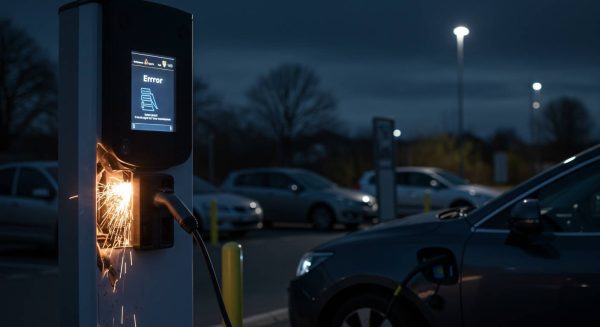With electric vehicles becoming increasingly common on UK roads, understanding your rights when charging infrastructure fails is essential.
Basic Consumer Rights
When you use a public charging point, you’re entering into a contract for service, and you’re protected by the Consumer Rights Act 2015. This means the service must be carried out with reasonable care and skill, within a reasonable time, and at a reasonable cost. Think of it like any other service: just as you’d expect a petrol pump to deliver the correct amount of fuel when you pay for it, you have the right to expect a charging point to deliver the electricity you’re paying for.
What Constitutes a Failure?
A charging point failure can take several forms:
- The charger doesn’t start, or stops mid-charge
- Payment systems malfunction
- The connector is damaged or won’t release
- The charger delivers power at a lower rate than advertised
- The display or interface isn’t working

Your Right to Redress
The Automated and Electric Vehicles Act 2018 sets out specific requirements for charging infrastructure. Under this legislation, if a charging point fails, you have the right to:
- Immediate Assistance Operators must provide a helpline or support service. The UK government introduced legislation that required all publicly available rapid charge points to meet 99% minimum reliability standards by the end of 2023.
- Refunds If you’ve paid but received no service, you’re entitled to a full refund. This is similar to getting your money back from a faulty vending machine.
- Compensation If the failure caused you additional costs (like having to be towed), you may be entitled to claim these back. Think of it like claiming compensation for a delayed train journey.
Making a Complaint
Step-by-Step Process:
- Contact the charge point operator first—their details should be displayed on the unit
- Keep evidence—take photos, save receipts, and note down times and dates
- If unsatisfied with the operator’s response, you can escalate to:
- The charge point network provider
- Your credit card company (if you paid by card)
- The Motor Ombudsman
- Citizens Advice
Future Protections
The government’s Electric Vehicle Infrastructure Strategy is strengthening consumer protections further. A new voluntary code of practice for EV energy consumer services was introduced in 2024, which set standards for complaint handling and customer service across both public and private charging.
What to Do in the Moment
If you find yourself at a failed charging point:
- Call the operator’s helpline
- Document the issue
- Look for nearby alternatives using charging apps
- Save all receipts and correspondence
Think of it like having a breakdown—you wouldn’t leave your car there indefinitely, but you would ensure you have evidence to support any later claim.
Remember, the charging network is still developing, and while teething problems are inevitable, your consumer rights are there to protect you. As more people switch to electric vehicles, these protections will likely become even more robust.
